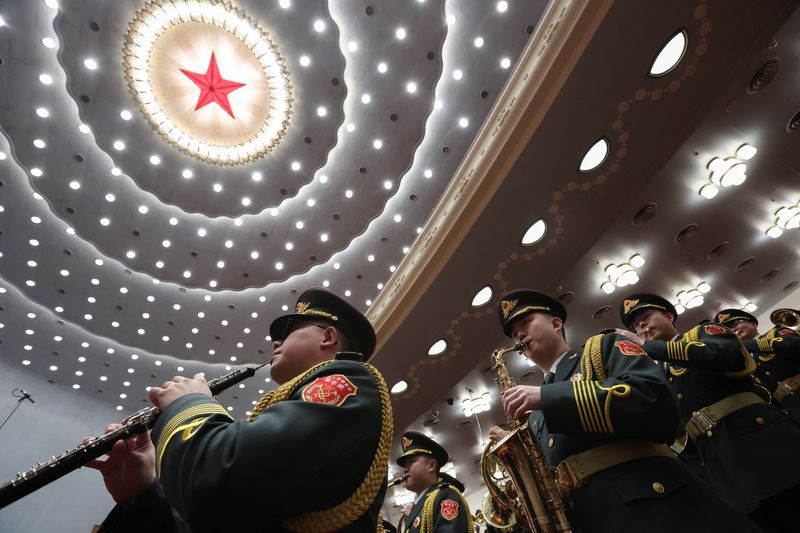By Liz Lee, Albee Zhang and Yew Lun Tian
BEIJING (Reuters) -China has scrapped one of the most widely-followed events on its economic and policy calendar, the premier’s post-parliament news conference, a move seen by some observers as a sign of the country’s increasingly inward focus and centralised control.
For three decades, during a period when China was opening up, the briefing had offered foreign investors and governments insights into how Chinese policymakers regard the challenges of managing what is now the world’s second-largest economy.
In a surprise announcement on Monday, a spokesman said China’s Premier Li Qiang will not brief the media at the close of this year’s annual parliamentary meeting, which begins on Tuesday in Beijing.
Moreover, barring special circumstances, Li will hold no such annual press conferences for the remaining term of China's parliament ending in 2027, National People's Congress spokesman Lou Qinjian said.
Since 1993, China's premiers have met the media after the annual parliament gathering, taking wide-ranging questions from Chinese and foreign journalists in news conferences broadcast live globally.
Throughout the 1990s and 2000s, China had actively sought to elucidate its politics and policies in a bid to attract foreign investment and boost trade.
"China was heading towards an era of opening up. Now it is heading towards an era of isolation, as shown by the cancelled premier news conference," said Chen Daoyin, a independent political commentator who formerly taught at Shanghai University of Political Science and Law.
Lou said the premier's news conference was cancelled because there would be more briefings on diplomacy, the economy and the livelihoods of the people by government ministers during the week-long parliament meeting.
The premier's annual meet-the-press session used to be the highlight of the parliamentary meeting, because as the head of the State Council and the main person tasked to run economic policy, he was seen as speaking with more authority and more big-picture perspective than cabinet ministers.
At the close of the annual parliament session last year, Li sought to reassure the country's private sector in his first media conference as premier.
While premiers generally toe the Communist Party line in their answers, some have in the past used the news conference to express views that struck a different tone.
For example, Li Qiang's predecessor, Li Keqiang, said in 2020 that 600 million Chinese earned less than $140 per month, a revelation that stood in stark contrast with the official line that China had eradicated rural poverty.
Wen-Ti Sung, a political scientist at the Australian National University, said that scraping the premier's news conference is Beijing's effort to further control the narrative about the state of China.
This does not mean that President Xi Jinping distrusts Li Qiang, the current premier, Sung said.

"This is consistent with their relations with Xi playing policy architect and Li playing Xi's faithful policy implementer."
"Willingly stepping away from the limelight is an act of loyalty," Sung said.